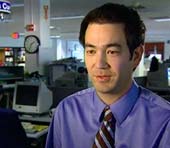Friday, May 12, 2006
Oh, you journalists...

When I left Scott Maier's "Power Journalism" class Thursday, I found myself slightly annoyed.
Steve Suo, a reporter for The Oregonian, visited good 'ol Power Journalism class at the University of Oregon Thursday and walked us through the information-gathering process of his award-winning series, "Unnecessary Epidemic," an investigative series that found that the U.S. government could alredy have stopped the epidemic that is quickly racing from west to east. The two-year research process led Steve from his office in Portland to meth "super labs" in California and to a total of 12 states searching for records of meth-related statistics. After the series was published, those two years became ongoing international travel. Steve now explains his findings and his techniques to journalists and law enforcement agencies around the world.
Steve's process of figuring out what the U.S. government probably should have already known sounded exciting and fresh. His comparisons of dips in meth treatment cases, posession arrests, potency and ID theft (which, in Oregon, is largely associated with meth use) showed that the entire meth market was susceptible to control - and that the government had already seriously affected the market twice, without knowing. Steve then found out what methods had worked on the large scale, and also offered solutions more specific to local and regional problems. Who wouldn't want to embark on a sociological, detective, statistical investigation like this?
My question is this: Why is it up to journalists to figure out how to stop meth use? Shouldn't there be a profession dedicated to following the thought process that Steve did and offering the world answers to such problems? The U.S. government's War on Drugs seems more like an episode of COPS than a concerned, pharmaceutical-questioning research organization.
Perhaps journalists posess a unique set of professional tools that allow us to investigate law, sociology, government, business and drugs all at once. We don't have a vested interest in any party we might find guilty and we are largely uncontrolled by the corporations that, at the end of journalistic investigations, are often found to be rediculously irresponsible.
But during a time when journalists are called out by the public for the most insignificant, honest mistakes, we are also taking on numbers of thankless, fruitless investigations that none of the "experts" have the drive to do.
Learning about Steve's experience was motivating on the journalistic level but it was also kind of frustrating, for me, when realizing that our government and even society's priorities are shaped more by beurocracy than by public need.
Here's a link to part one of the five-part series.
Comments:
<< Home
You ask, Why is it up to journalists to figure out how to stop meth use? My answer: If the scientists, the cops, the politicians aren't, who else will step in? I believe it is the media's role to seek answers to the society's tough issues, especially when no is really paying attention.
Post a Comment
<< Home

